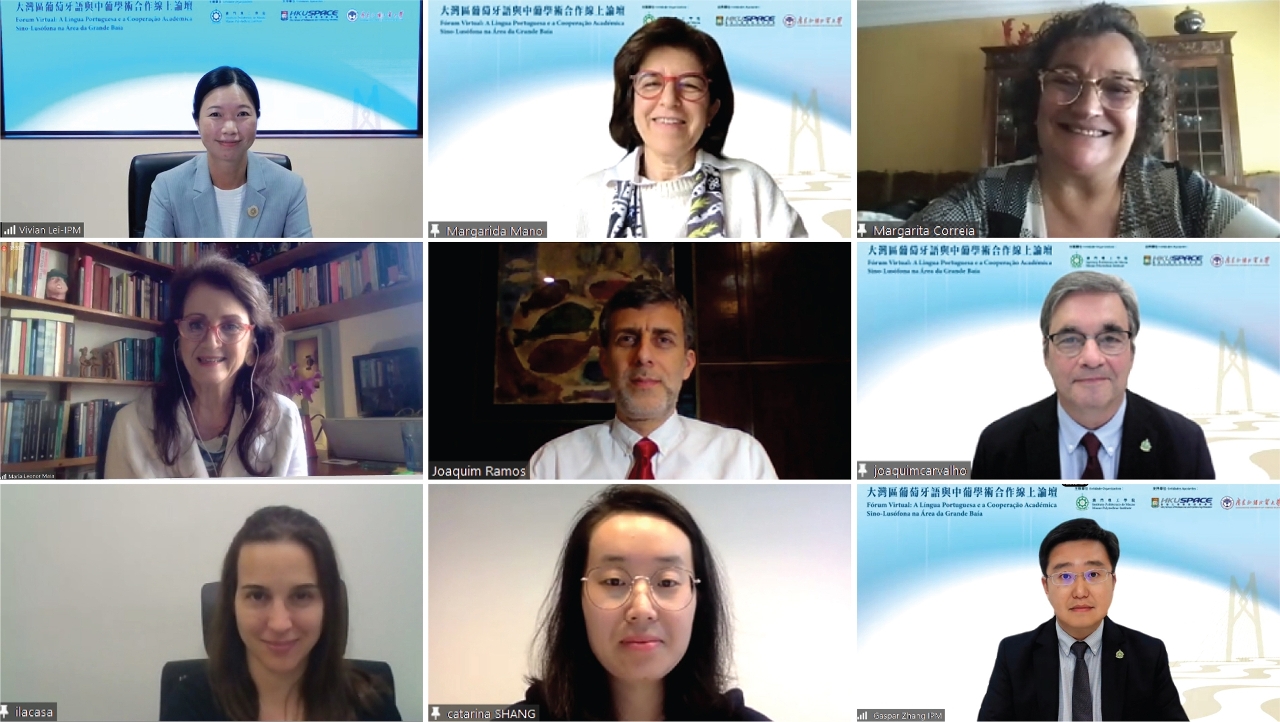 MPI held the “The Greater Bay Area Portuguese Language and Sino-Portuguese Academic Cooperation” online Forum
MPI held the “The Greater Bay Area Portuguese Language and Sino-Portuguese Academic Cooperation” online Forum
In order to facilitate the academic exchanges and cooperation between China and Portugal in the Greater Bay Area era, and promote the connection and integration of the Guangdong-Hong Kong-Macao Greater Bay Area with the national academic network of the Lusophone countries, the Centre for Portuguese Studies of the Macao Polytechnic Institute held the“The Greater Bay Area Portuguese Language and Sino-Portuguese Academic Cooperation” online Forum on April 20. Famous experts from the Guangdong-Hong Kong-Macao Greater Bay Area and the Lusophone countries gathered in the cloud to provide suggestions for the academic development of the Greater Bay Area and Sino-Portuguese academic cooperation. The forum attracted the enthusiastic participation of many teachers and students, researchers from higher education institutions, and other researchers in various related fields from all over the world.
Lei Ngan Lin, the Vice President of Macao Polytechnic Institute, pointed out in her welcome speech that the construction of the Guangdong-Hong Kong-Macao Greater Bay Area has brought new historical opportunities to deepen Sino-Portuguese academic cooperation. Universities in Guangdong, Hong Kong and Macao have joined hands to actively connect with the Lusophone countries with Portuguese as a link. The academic network contributes to the prosperity of the Sino-Portuguese academic ecosystem. The speakers in the online Forum included: Margarida Mano, the Chair of the Management Forum of Higher Education in Portuguese Speaking Countries and Territories and also the Vice President of the Catholic University of Portugal; Margarita Correia, the Chair of the Academic Committee of the International Portuguese Language Institute; Maria Maia, the Chair of the Brazilian Association for International Education; Joaquim Ramos, the Director of the Portuguese Oriental Institute of Macau; Joaquim Carvalho, the Director of the International Portuguese Training Centre of the Macao Polytechnic Institute; Irene Lacasa, the Program Director of English and European Language of the School of Professional and Continuing Education of The University of Hong Kong; Shang Xuejiao, the Dean of the Portuguese Language Department of Guangdong University of Foreign Studies; and Zhang Yunfeng, the Director of the Centre for Portuguese Studies of Macao Polytechnic Institute, who hosted the Forum.
Margarida Mano pointed out that there are more than 10 million higher education students studying Portuguese in the world. The prospects for academic cooperation between China and Portugal are broad. At present, the Lusophone countries and universities in Macao have established academic cooperation; she looks forward to the universities in Guangdong and Hong Kong joining the Portuguese-speaking international academic cooperation circle. Margarita Correia expressed the expectation to combine the advantages of Portuguese language teaching in Macao, and in-depth cooperation with universities in the Greater Bay Area in the fields of Portuguese language ontology and acquisition research, Portuguese language teacher’s portal development, etc., so as to jointly promote the level of Portuguese language teaching and research around the world. Maria Maia mentioned that the international cooperation methods of higher education have undergone tremendous changes under the epidemic. Brazil is currently actively seeking international partners and is looking forward to opening new cooperation models with universities in the Greater Bay Area through online methods.
Joaquim Ramos said that the demand for Portuguese language teaching in the Greater Bay Area is increasing day by day; he expects the cooperation of universities and institutions in the Greater Bay Area and Lusophone countries to further improve the academic level of Portuguese language in the Greater Bay Area through teacher training, teaching materials publication, and academic seminars. Joaquim Carvalho pointed out that as the Guangdong-Hong Kong-Macao Greater Bay Area is one of the most important metropolitan areas, there is a lot of space for cooperation in higher education, economy and culture. Lusophone countries should seize the opportunity to gain a deeper understanding of the Greater Bay Area and take new steps to upgrade Sino-Portuguese academic cooperation. Irene Lacasa pointed out that Portuguese language teaching has broad prospects in Hong Kong, and it is hoped that international exchange programs can be established for teachers and students with universities in the Greater Bay Area. She especially hopes to send students to study in Macao to learn through practice and get to know the characteristics and culture of Macao. Shang Xuejiao said that universities in the Greater Bay Area and the Lusophone countries could establish think tanks in cooperation between China and Lusophone countries through joint construction and sharing of academic platforms, so as to further promote multi-level and multi-dimensional interdisciplinary exchanges and cooperation between China and Portugal.
“The Greater Bay Area Portuguese Language and Sino-Portuguese Academic Cooperation” online Forum was organised by the Centre for Portuguese Studies of the Macao Polytechnic Institute; supported by the Guangdong University of Foreign Studies and the School of Professional and Continuing Education of Hong Kong University. The online Forum provided participants with an in-depth understanding of the Guangdong-Hong Kong-Macao Greater Bay Area and a new perspective for the Lusophone countries, and at the same time provided a new opportunity for deepening the academic exchanges between China and Portugal. In the future, the Centre for Portuguese Studies will further utilize its advantages in the academic network of Portuguese and Lusophone countries and contribute to the promotion of academic exchanges and innovative cooperation between China and the Lusophone countries as well as other “Belt and Road” countries.


